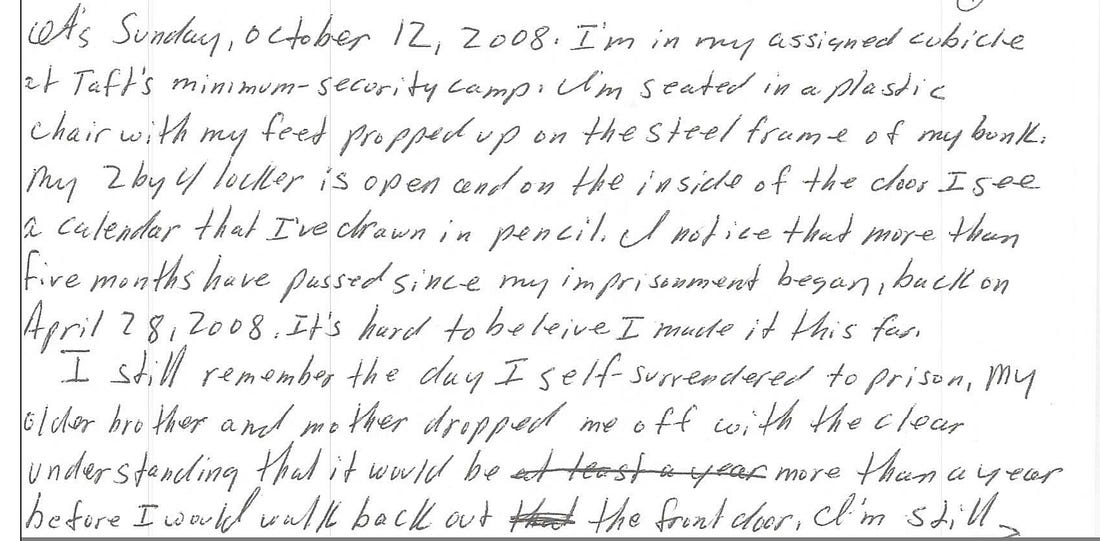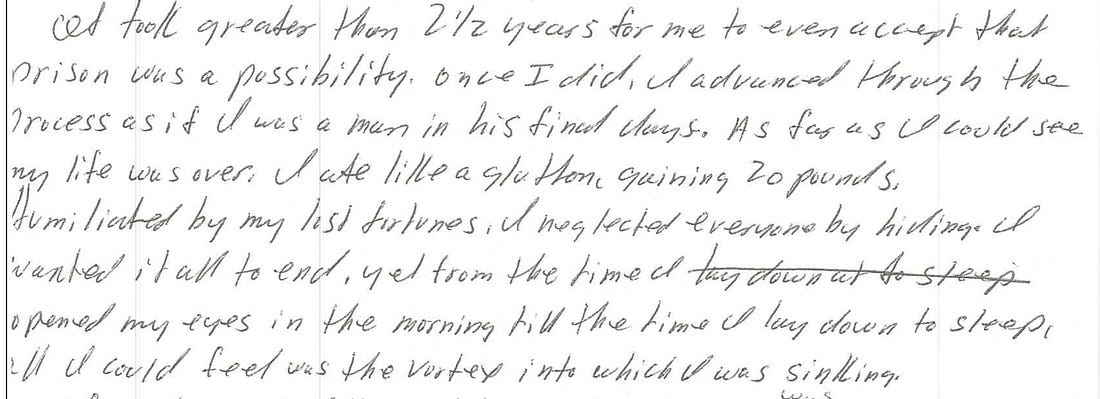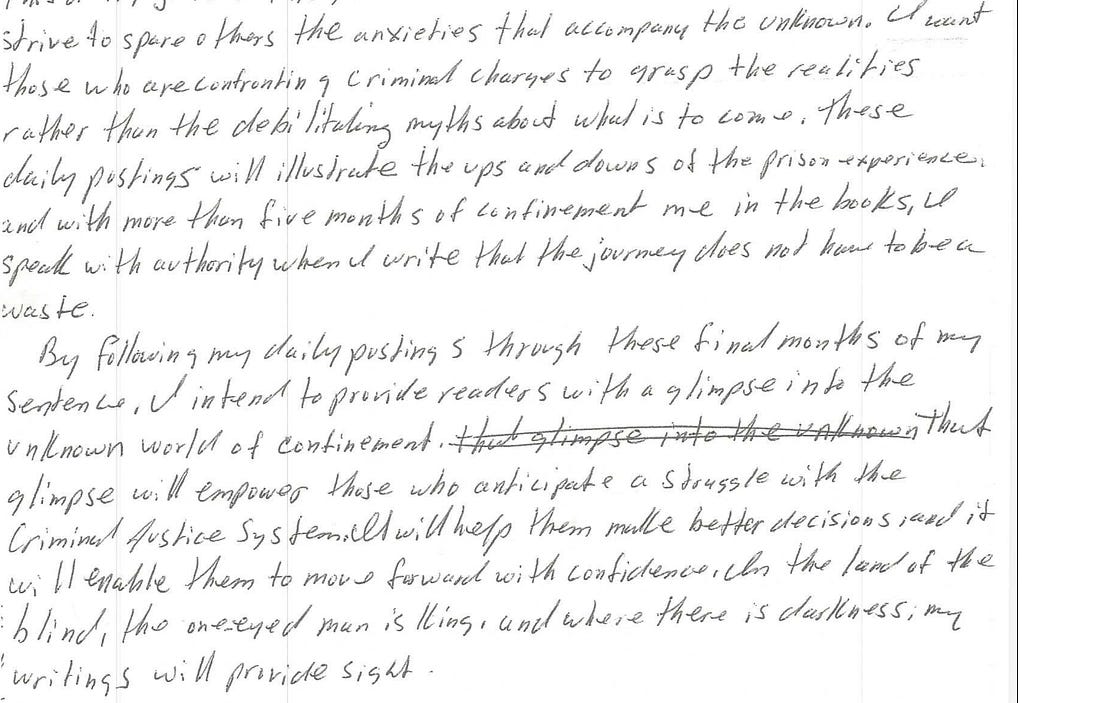“What the hell do you mean, create assets that don’t exist? My lawyer has no clue either.”
I received this message on Friday night from someone who is facing an upcoming sentencing in Texas.
After 16 years of these messages, I know what that really means: With sentencing only days away, he hasn’t done the work to influence his probation officer or his judge. No evidence. No personal record to show why he’s more than his plea agreement. There is nothing to counter the government’s version of events. After we spoke, my assumptions were confirmed.
We can’t change the fact that he failed to prepare before Monday. But that doesn’t mean he can’t do better moving forward. The same applies to anyone reading this.
When I created my first asset, a blog from prison on October 12, 2008, I knew it wouldn’t shorten my sentence by a single day. There were no incentives. No earned-time credits under the First Step Act. No expanded home confinement. I built that record because it was the right thing to do. It gave me purpose. And it showed a side of me that the DOJ press releases didn’t care to include.
That was then.
Today it’s different.
Because of reform, the record you build can do more than influence judges and probation officers. It can earn you more liberty once you’re in custody. Documented effort, programs, and contributions can accelerate halfway house or home confinement.
Michael was in D.C. again this week, advocating for more incentives. But you don’t need to wait for Washington to act. The opportunity already exists inside the system today.
“While we are postponing, life speeds by.” – Seneca
Waiting until sentencing week or waiting for the next round of reform makes the effort look rushed and insincere.
That first blog I wrote from prison was an asset. So was every one that followed. Whether you jot notes on a napkin or build something structured on PrisonProfessors.org, the act of producing and sharing starts changing the narrative. It shifts the one-sided version put out by the DOJ’s marketing, sorry, press department, and gives judges, probation officers, case managers, and even the Bureau of Prisons a fuller picture of who you are.
I built my record when it wouldn’t move my release date a single day. You can build yours now, and it may move you home sooner.
It changed everything for me starting October 12, 2008, months into my prison term.
When will you start creating assets?
Justin Paperny
Below is my first blog, or asset, from prison.

It’s Sunday, October 8th 2008. I’m in my assigned cubicle at Taft’s-Minimum Security Camp. I’m seated in a plastic chair with my feet propped up on the steel frame of my bunk. My 2 x 4 locker is open and on the inside of the door I see a calendar that I’ve drawn in pencil. I noticed that more than five months have passed since my imprisonment began, back on April 28, 2008. It’s hard to believe I made it this far.
I still remember the day I self surrendered to prison. My older brother and mother dropped me off with a clear understanding that it would be more than a year before I would walk back out the front door.
I’m still haunted by the tears that came from my mother, as I was led away by the correctional officer and handcuffs. No one should have to endure such heartache.
I’m serving an 18 month sentence for crimes related to my earlier career as a stock broker at UPS. I had graduated from USC in 1997, and I had built a successful practice as a professional investment advisor during my 20s. My particular focus was managing money for professional baseball players and executing bulk trades for hedge funds. Prison was not part of the life trajectory that I had envisioned.
The investigation that led to my confinement started on December 15, 2004. From that day forward I felt wrecked with anxiety. Living in denial, I made some awful decisions. My delusions into believing that I would not be targeted for prosecution. Let me into a web of lies, those lies resulted in me spending tens of thousands in unnecessary legal expenditures and they expose me to the potential of much stiffer legal sanctions.
Besides the cost, which approached a quarter million dollars, my total ignorance of the legal process, resulted in unnecessary stress for my family and friends. None of us knew anyone who had gone through the criminal justice system before. My life quickly turned into a self fulfilling prophecy, convincing myself, and everyone around me that it would be fine. I did not even have the foresight to cancel my application to join prestigious. Lakeside country club, and my ultimate conviction cause great embarrassment to the members who sponsored me.
I failed to study so I can learn the differences between minimum security camps, and those lockdown prisons that have become so popular on those alternative television networks. I still remember my mother telling me, “Son, you are not made for prison, so you better prepare and cooperate fully.” Her advice went in one ear and out the other.

It took greater than 2 1/2 years for me to even accept that prison was a possibility. Once I did, I advanced through the process, as if I was a man and his final days. As far as I could see my life was over. I ate like a glutton, gaining 20 pounds. Humiliated by my lost fortunes, and neglected everyone by hiding.I wanted it all to end, yet from the time I opened my eyes in the morning till the time I lay down to sleep, all I could feel is the vortex into which I was sinking.
In retrospect, I know that what I needed was a guide. My struggles felt magnified because I had no idea about what would happen from one day to the next. It turns out, my concerns about prison were way overblown. It is no club fed, but without fences and bars, Taft is hardly reminiscent of a “true” prison, and when I asked my attorney what I could expect, he could not provide the specifics I craved. “You’ll be fine,” the best he could muster.
The day I self-surrendered was the worst. I just had no idea about what to expect. The handcuffing, the strip search, the fingerprinting, the DNA sample and mug shot initially seem too much to take. I was locked in a small cell while I waited to be processed to the camp. When I finally made it to the camp, I felt exhausted and lost. I remember feeling overwhelmed as if months would never pass.
I did not know anything about good time possibilities or halfway house options or what awaited me on supervised release. I tried to sleep, but struggled with the tormented thoughts that came with separation from home. I missed my mother, my father, my brother, my dog. The concrete and steel of prison, the indignity of common restrooms, the total lack of privacy seemed too much to take.
Day by day, however, I grew stronger. I began to set little goals, and empowered myself with success. Exercise helped. I had been a baseball player at USC, yet the pursuit of my career brought a simultaneous neglect of my fitness. On my second day of prison, I began to run. I huffed and puffed around the track, determined to power through 3 miles. I wrote the stationary bike, and strength trained with push-ups, pull-ups, and dips. Slowly, I could see that I was willing my way into better spirits.
After a few months, I reached a small victory when my counselor agreed to transfer me from a three-man cubicle into a two-man cubicle. Then, a couple of months after that, I was promoted to a job that offered more free time for me to work on my personal goals. The time opened more opportunities for introspection. That was when I realized that others were confronting the same challenges as me.

Convinced that I could help them, I decided to begin writing this daily journal. In these daily recordings of my activities, I strive to spare others the insides that accompany the unknown. I want those who are confronting criminal charges to grasp the realities rather than the debilitating myths about what is to come. These daily postings will illustrate the ups and downs of the prison experience, and with more than five months of confinement in the books, I speak with authority when I write that the journey does not have to be a waste.
By following my daily postings through the final months of my sentence, I intend to provide readers with a glimpse into the unknown world of confinement. That glimpse will empower those who anticipate a struggle with the criminal justice system. It will help them make better decisions, and it will enable them to move forward with confidence. In the land of the blind, the one eyed man is King, and where there is darkness, my writings will provide sight.
Justin Paperny
Taft Federal Prison Camp
#44499-112



